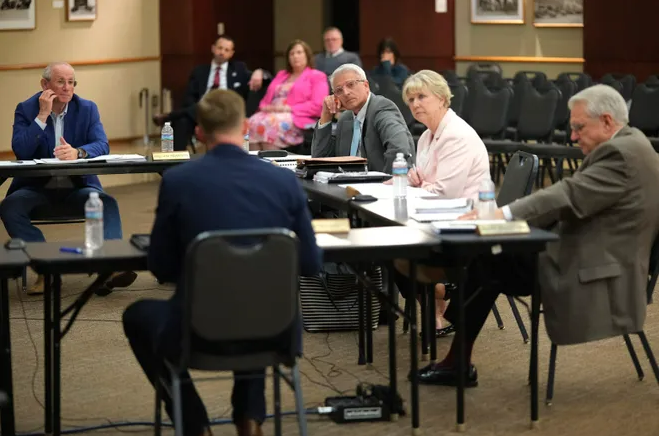
Editor’s note: For related posts from reimaginED senior writer Lisa Buie, click here and here.
Concerned about conflicting attorney general opinions and the certainty of a lawsuit, members of Oklahoma Statewide Virtual Charter School Board unanimously voted to disapprove the application for what would be the nation’s first religious charter school.
The vote was a procedural move to buy time so board members could gauge the risk of personal liability following their final vote on St. Isidore of Seville Catholic Virtual School. Board members turned down the application on Tuesday after sidestepping the legal issue and instead raising questions about the school’s governance structure, special education plan, how it would prevent government money and private donations from co-mingling and technology.
“Do we have assurance from counsel if we are sued that we would have protection and support from the Attorney General’s Office?” board Chairman Robert Franklin asked during the discussion. “In recent history this board has been sued collectively and individually.”
The board’s counsel, Deputy Attorney General Niki Batt, said board members would receive representation if they were following state law and their actions were in the scope of their board position.
She said Oklahoma law explicitly states that no public money can be applied to support any religion.
That drew concern from board member Scott Strawn, who said, “Candidly, it feels like – intentional or not – that we’re basically being told make a decision against the advice of the attorney general and you may or may not have immunity.”
Heightening the tension are two conflicting legal opinions and statements the governor made about them.
Former Attorney General John O’Connor issued an opinion in December as his final official act that came as the statewide virtual charter school authorizing board was set to decide on the application for St. Isidore of Seville Catholic Virtual School, which the Archdiocese of Oklahoma City and the Diocese of Tulsa want to open to serve students in rural areas without a traditional Catholic school and to expand course offerings for students who already attend Catholic schools.
O’Connor said in his opinion that the state’s ban on publicly funded charter schools operated by sectarian and religious groups could violate the U.S. Constitution’s First Amendment and should not be enforced.
His successor, Gentner Drummond, withdrew O’Connor’s opinion and argued that it was based on precedent for private schools. Drummond said that state law defines, and the attorney general has previously recognized, charter schools as public schools, and that allowing the state to sponsor a religious school would create “a slippery slope” to use religious liberty to justify state-sponsored religion.
The clash promoted Gov. Kevin Stitt to weigh in by releasing a letter disagreeing with Drummond’s withdrawal of his predecessor’s opinion.
“You contend that the United States and the Oklahoma Constitutions permit, and indeed require, the state to discriminate against religious organizations seeking authorization to operate charter schools,” Stitt’s letter said. “In fact, the opposite is true.”
The letter continued, “These prohibitions run afoul of the non-discrimination principle articulated by the U.S. Supreme Court in recent cases.”
During Tuesday’s board meeting, state schools Superintendent Ryan Walters said he and the Oklahoma Department of Education would provide support to board members who approve the school’s application, thought it was unclear if that include legal representation.
Brett Farley, executive director of the Catholic Conference of Oklahoma, told The Oklahoman that the vote came as no surprise.
“This is fairly normal for their application process,” Farley said. “It gives us more time to address their concerns, and so we’ll do that and come back and present those and see where we go.”
By turning down the application, members reset the clock on when a final vote must be taken. The rules allow applicants who are initially disapproved to make changes and resubmit their applications for a vote within 30 days. Had the board simply postponed Tuesday’s vote, the deadline for final approval would have been April 29.
You can watch a recording of the meeting here starting at the 49:22-minute mark.


